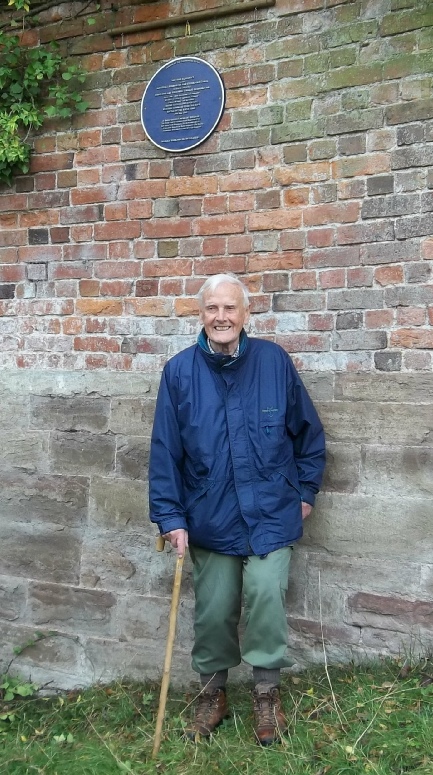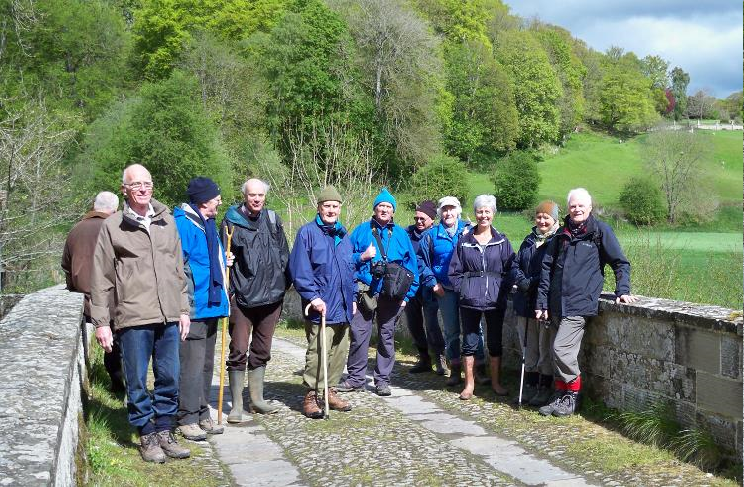

BRYAN HEATLEY RIP 15th October 2023
Quite often societies are lucky enough to have a good, dedicated treasurer who can be relied upon to look after the societies funds. However it’s not often that societies get to have not only an extremely well qualified treasure but also one that did the job for over 20 years!
A founder member of the society in 2002 Bryan was, throughout his time with the FoLC a keen and dedicated supporter of the Leominster Canal. His untimely passing in 2023 was a huge stock to the FoLC and he will be greatly missed.

Friends of the Leominster Canal (FoLC) were saddened to be told, by his family, that Bryan Heatley, its life-
Bryan was born in Liverpool and had a long professional career in finance. After National Service, in parallel with his financial career, he joined the Territorial Army (TA), holding positions in the Royal Corps of Transport and finally the elite Squadron 23 Special Air Service Regiment (TA Special Reserve). He rose to the rank of major, in commanding positions and being decorated twice in 1967 and 1978. As to be expected, Bryan rarely talked about his military career. On one occasion, however, he did share an ‘unnerving’ piloting experience at Shobdon airfield and, on another, he provided a brief glimpse of a treasured special commemorative coin, in a black felt lined case, with the SAS motto ‘Who Dares Wins’ on its back.
Bryan undertook various roles in his local church, Ludlow Civic Society and Ludlow Conservative Party; often displaying a natural flair for fundraising.
His army career signalled a lifelong enthusiasm for all aspects of transport, going through phases including aviation, railways, trams, buses, motor cars and canals. As a reflection of this interest, on his retirement, he became Chairman of the Transport Trust, the national charity for the preservation of transport heritage, from 1991 to 1999.
Several early members of FoLC had already become established friends of Bryan, through either membership of the Railway and Canal Historical Society (RCHS) and/or the Herefordshire and Gloucestershire Canal Trust, where he had been its chairman during 1997.
Two of Bryan’s main areas interest in canals resulted in publications, comprising two on the so-
In 2002, supporting its founding chair Martin Hudson, Bryan himself became a founding member of FoLC, a founding committee member and its first Treasurer; in view of his substantial financial expertise. Except for a short period of absence, due to illness in 2009, Bryan remained its only treasurer up to his death. FoLC finances always remained secure under Bryan’s expert stewardship and, quite appropriately, any reason for FoLC expenditure had to be robustly defended!
The Rea Aqueduct also held a special place in Bryan’s heart and he worked tirelessly on two substantial FoLC campaigns, writing many letters to MPs, Historic England, the National Trust, government bodies and local councils. These campaigns included both its attempted public footpath closure in 2005 combined with ‘Save the Rea Aqueduct’ and later a crusade for heightened awareness of the aqueduct, following its partial collapse in 2013. In addition, those now able to visit the Corn Brook culvert owe Bryan special thanks for resolving the problematic issues over access and, in 2007, for the successful re-
Bryan was the lead committee member for FoLC to apply and be successfully granted charity status in 2006. This action transpired to be very prudent, in terms of safeguarding FoLC monies, receiving gift aid and other donations, fundraising and enhancing the status of FoLC in discussions with external bodies.
Bryan was the sole and dedicated instigator of ‘Discover the Leominster Canal’. This was an educational public event spread over a weekend in 2016, including a packed lecture in Leominster’s Grange Court and a public site visit. The latter, appropriately, was centred on the Teme Aqueduct.
In 2019, FoLC were instrumental, in partnership with Historic England, in placing a Grade 2 listed blue plaque on the Teme Aqueduct. This was to especially highlight the role of the 216 Army Field Company, Royal Engineers (TA) in its partial demolition during Exercise Hops in May 1941. With no hesitation by Trustees, it was unanimously agreed that only one person could be considered suitable for unveiling the plaque; namely, of course, Major Bryan Heatley. Bryan accepted the invitation with obvious delight and subsequently shared that this was one of his most savoured moments in his life. Appropriately, this was featured as an illustrated article in Waterways World and a visual recording was placed on YouTube.
Bryan led a number of guided walks for FoLC and they all went ‘one step beyond’. These included field visits to each end of the planned Ludlow Canal, several visits to Downton Gorge and the Kyre Valley Railway. His highly popular guided walks around Ludlow, including being also both a Town and Church Guide, always drew large numbers and not infrequently finished with a personal invitation to visit St Julians; for all to enjoy the generous hospitality provided by himself and wife Marie; who now survives him. This would often include an, expertly selected, special French wine!
In his spare time (!), Bryan managed to be a keen philatelist.
Bryan is widely recognised to have been a highly upstanding person and although Bryan would always defend his sometimes forthright opinions, this would often be accompanied by his wonderful dry sense of humour.
Bryan will be sadly and greatly missed by all. This includes not only the many locals who stopped to chat to Bryan on Ludford Bridge, but also to those who eagerly awaited his arrival, in his renowned Jaguar car, for either FoLC walks or meetings; when he invariably added immense interest and information to the event, in his own individualistic but wise manner.

Special thanks to FoLC trustee David Slater for writing this tribute.
